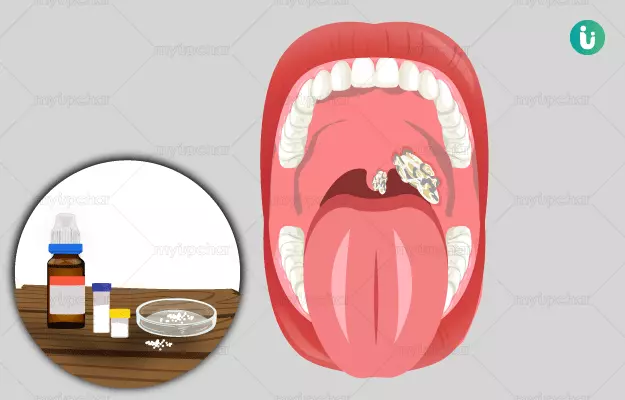Diphtheria is an acute bacterial infection caused by Corynebacterium diphtheriae. The condition mainly affects the throat and upper airway but the toxin produced by the bacteria infects other organs as well. Sore throat, low fever and swollen glands in the neck are the characteristic symptoms of diphtheria infection. The disease spreads easily through direct physical contact or by inhaling the droplets released when an infected person coughs or sneezes. It has a death rate of 5-10%, with a higher mortality in children; however, vaccination has drastically brought down the death rate of diphtheria.
India contributes significantly to the global burden of diphtheria. In the last 20 years (1996-2016), diphtheria cases were frequently reported in school-going children. The coverage of three doses of diphtheria vaccine was 80% in 2015-2016, as per national health surveys. The strategy of preventing diphtheria must focus on enhancing coverage of the vaccine administered as part of the Universal Immunisation Programme and introducing the vaccine for school-going children. The condition is mostly treated with antibiotics. Antitoxins are also given to neutralise the bacterial toxin and prevent damage to organs.
Homeopathic remedies are divided into three classes depending on their efficacy in treating the disease. In the first class, lachesis and lycopodium are the two remedies of choice. Apis, arum maculatum, bryonia, belladonna, kali bichromicum, lac caninum, mercurius iodatus, mercurius solubilis and phytolacca decandra are considered second-class remedies, whereas aconite, arsenicum, bromine, cantharis, lachnanthes and sulphur are used as third-class remedies. These remedies are chosen on the basis of individual symptoms and characteristics like their age and overall health.
- Homeopathic medicines for Diphtheria
- Dietary and lifestyle changes for Diphtheria as per homeopathy
- How effective are homeopathic medicines and treatments for Diphtheria
- Side effects and risks of homeopathic medicine and treatment for Diphtheria
- Takeaway
Homeopathic medicines for Diphtheria
The following are some homeopathic remedies for diphtheria:
- Lachesis Mutus
Common Name: Bushmaster or surucucu (lachesis)
Symptoms: Being a remedy made from snake poison, lachesis helps in the treatment of conditions that cause sepsis (a blood infection). It also helps reduce an increased tendency to bleeding. Diphtheritic paralysis and carriers (persons who are infected but not manifesting the signs and symptoms) are common indications for use of this remedy. It also helps relieve the following symptoms:- Presence of dusky, blackish membrane in the throat
- Chronic soreness of throat, making it difficult to swallow
- Throat pain that is aggravated by hot drinks
- Problems that begin on the left side
- Vision problems after getting infected with diphtheria
- Feeling suffocated on lying down
- Larynx pain, especially on touching
- A sensation as if there is a plug in airway that keeps on moves up and down
- Purpura (bleeding spots) on the skin
Symptoms worsen in spring, closing eyes, after sleeping, taking a warm bath, or having hot drinks, while they improve with warm applications.
- Lycopodium Clavatum
Common Name: Club moss (lycopodium)
Symptoms: Urinary and digestive disturbances are common indications for this remedy. People who benefit from this remedy tend to develop symptoms gradually, and their symptoms run from right to left. Club moss helps relieve the following symptoms:- Inability to tolerate cold drinks
- Blocked nose
- Yellowish discolouration of face
- Dry throat with stitching pain on swallowing
- Ulcers in vocal cords
- Tubercular laryngitis (inflammation of the voice box)
- Blisters on tongue
- Cough with thick grey expectoration
Symptoms aggravate from heat, in warm rooms, and with warm applications, except for throat and stomach symptoms, which are relieved by warm drinks. The symptoms improve after midnight, from warm food and drinks, getting cold and being uncovered.
- Kalium Bichromicum
Common Name: Bichromate of potash (kali bichromicum)
Symptoms: This remedy specifically affects the mucous membrane of the airways and the gastrointestinal system. It also acts on the kidneys and heart. Bichromate of potash is used to manage the following symptoms:- Migrating pain
- Anaemia
- Pain with a sensation of pressure at the root of nose
- Ulceration of nasal partition
- Thick, ropy, greenish-yellow discharge from the nose
- Dry mouth with smooth, shiny, dry, red tongue
- Swelling in the parotid glands
- Pseudo-membranous (layer resembling a membrane) deposit on the palate and tonsils
- Stringy discharge from mouth and nose
Symptoms worsen in the morning, on drinking beer, and on undressing and improve with heat.
- Mercurius Iodatus Ruber
Common Name: Bin-iodide of mercury
Symptoms: The following symptoms are treated using this remedy:- Sore throat with ulcers
- Pain while swallowing
- Stiffness of throat and neck muscles
- Burnt feeling on the tongue
- Swollen salivary glands
- Fissures and cracks, and syphilitic ulcers on the skin
- Aconitum Napellus
Common Name: Monkshood
Symptoms: Monkshood is usually given for the management of acute infection with fever. People who benefit from this remedy tend to be anxious, restless and scared. It helps relieve the following symptoms:- Throbbing and burning headache with a sensation of heavyness
- Red and swollen eyes, the person feels as if they have sand in their eyes
- Blocked nose with dry mucous membrane
- Nosebleeds
- Dry throat with a burning and stinging sensation
- Swelling in tonsils
- Inflamed skin
- Reddish eruptions on the skin
Symptoms worsen in the evening and at night, in warm room and on lying on the affected side but improve in open air.
- Arsenicum Album
Common Name: Arsenious acid, arsenic trioxide
Symptoms: Arsenicum album is indicated for the management of anaemia, degenerative changes, and septic infections with reduced immunity. It also helps relieve the following symptoms:- Excoriating watery discharge from the nose
- Mouth ulcers
- Dry mouth
- Unhealthy gums
- Edema in throat along with difficulty in swallowing
- Presence of diphtheritic membrane in the throat which appears dry and wrinkled
- Dry, scaly, and itchy skin with papular eruptions
- Psoriasis
Symptoms aggravate after midnight, in wet weather, and on consuming cold drinks. The patient feels better on taking warm drinks and keeping their head elevated.
-
Bromium
Common Name: Bromine (bromum)
Symptoms: Bromine is mostly indicated for the treatment of respiratory problems affecting the voice box and windpipe. It helps manage the following symptoms:- Hoarseness
- Pain in tonsils on swallowing
- A tickling sensation in the windpipe on breathing in
- Dry cough along with a burning pain behind the breastbone
- Laryngeal diphtheria - a condition in which the diphtheria membrane begins in the larynx (voice box) and spreads upward
Symptoms worsen in the late evening, while resting and in a warm room, but improve with exercise, movement and at sea.
- Cantharis Vesicatoria
Common Name: Spanish fly (cantharis)
Symptoms: Individuals who benefit from this remedy have the following symptoms:- Coated tongue that appears furry with red edges
- A burning sensation in the throat and mouth
- Difficulty in swallowing liquids
- Aggressive spasms on touching larynx
Dietary and lifestyle changes for Diphtheria as per homeopathy
Since homeopathic medicines are used in the minimum effective dose, the diet of the patient should be devoid of substances having medicinal properties since they can nullify or diminish the effect of these medicines and act as an obstacle in the line of treatment. Here are some other do's and don'ts that homeopathic doctors suggest along with prescribing the remedies:
Do’s:
- Wear cotton instead of linen garments in warm weather.
- Be physically active by doing regular exercises and eat appropriate, non-medicinal foods for faster healing in chronic cases.
- In acute cases, patients show a desire for certain foods and drinks. Gratifying these desires may only pose a slight obstacle in the radical removal of disease. Hence, it is advised to gratify the patient’s desires without refusing or persuading any food or drink.
Don’ts:
- Avoid beverages like herb tea, coffee and liquors or beer with medicinal spices.
- Avoid spicy dishes, soups and sauces made of onions, celery, meat and old cheese that have medicinal qualities.
- These medicines must not be stored near perfumes, camphor, ether or other volatile products, as they neutralise the effect of the medicines.
- Sedentary lifestyle and uncleanliness must be avoided.
- Staying in damp rooms or marshy places should be avoided.
How effective are homeopathic medicines and treatments for Diphtheria
Homeopathy has been effective in treating a number of diseases, including diphtheria. Before the advent of vaccination, diphtheria appeared periodically, but rarely showed the same kind of presentation. Therefore, a remedy that was effective in one year was less likely to be useful the next year. Hence, it was necessary for the practitioner to analyse each case individually. In a three-year record of diphtheria in Broome County, NY, from 1862 to 1864, a mortality rate of 83.6% was noted in cases treated with allopathy compared to 16.4% with the homeopathic approach.
In 1799, Dr Samuel Hahnemann, the founder of homeopathy, first discovered the efficacy of homeopathic remedies in preventing epidemic diseases like scarlet fever. It was then successfully used in other epidemics and outbreaks. In 1932, Dr Chavanon published an experiment conducted on 45 children who tested negative for Schick test (test indicating the presence of antibodies to diphtheria) after being treated with homeopathy.
In 1941, Drs Patterson and Boyd showed similar results while conducting the test on 33 children, of which 23 tested negative after homeopathic treatment. Dr Roux repeated the test in 1947 and obtained similar results.
Side effects and risks of homeopathic medicine and treatment for Diphtheria
The biggest advantage of homeopathic treatment is that it has minimal to no side effects. Homeopathic medicines are considered safe and non-toxic in nature. Since the medicines are derived from natural sources, such as plants, animals and minerals, they can be safely used in patients of all ages. When used as complementary therapy, they usually do not interact with conventional medicines. However, it is best to consult an experienced physician before taking any remedy on your own.
Takeaway
Diphtheria is a potentially life-threatening disease caused by the bacteria Corynebacterium diphtheria. It mainly affects the respiratory system but can also effect other organs and cause symptoms like sore throat, difficulty breathing, fever and weakness. The condition is now preventable by vaccination and treated with antibiotics and antitoxins.
Homeopathy embraces a holistic approach and treats the person as a whole, instead of treating only the disease. Homeopathic medicines are given according to the disease expressed by the person in totality, and not merely a labelled sickness. There are no known side effects or contraindications to their use and no reported interactions between homeopathic and conventional medicines. Only a qualified homeopathic practitioner should be consulted for receiving homeopathic treatment to receive optimal benefit from the chosen remedies.
Find Homeopathic Doctor in cities
Doctors for Homeopathic medicine, treatment and remedies for Diphtheria

Dr. Rutvik Nakrani
Homeopathy
6 Years of Experience

Dr. Jyothi
Homeopathy
23 Years of Experience

Dr. Urvashi Chaudhary
Homeopathy
8 Years of Experience

Dr. Anita Kumari
Homeopathy
12 Years of Experience
References
- World Health Organization, Department of Reproductive Health and Research. Diphtheria. Fifth edition; World Health Organization; 2010.
- Murhekar M. Epidemiology of Diphtheria in India, 1996-2016: Implications for Prevention and Control. . Am J Trop Med Hyg. 2017 Aug;97(2):313-318. PMID: 28722581
- National Centre of Homeopathy. Treatment of Epidemics with Homeopathy - A History. Mount Laural NI; [Internet]
- National Centre of Homeopathy. Homeoprophylaxis: Human Records, Studies and Trials. Mount Laural NI; [Internet]
- British Homeopathic Association. Is homeopathy safe?. London; [Internet]









